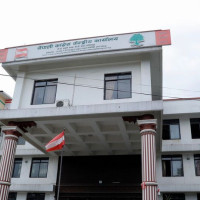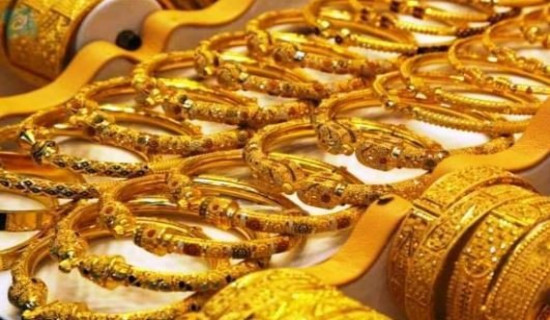- Wednesday, 25 February 2026
Brisk business out of scrap materials collection
By Hari Prasad Koirala,Urlabari Sept. 27: To make a living, people can take up any kind of trade, provided they are hardworking and diligent. For the past month, Indians have been seen in the inner villages of Morang, exchanging Kawadi (scrap items), particularly old mobile phones and batteries, for glassware and onions.
The catchy jingle played by the kawadi wala (scrap collectors), who cycles from village to village with a loudspeaker attached to his handlebars, catches the attention of passersby. Though the jingles are played in Nepali, the scrap collectors themselves do not understand the language.
The jingle goes, “Give me a scrap mobile phone and any type of battery, and get two new glass tumblers in return.”
It has been over fifteen years since mobile phones first reached Nepal’s villages, yet 35-year-old Sarajul Mian from Katihar district in Bihar, India, earns INR 20,000 a month by trading old mobile phones for glassware.
It’s not just Sarajul; a team of eight, including 38-year-old Mohammad Ayub from Sitamadhi district, also roams the villages of Morang, trading old mobile phones for glassware.
Previously, Sarajul and Ayub used to barter salt, onions, and garlic for scrap iron and plastic containers. However, with the rising demand for old mobile phones in India, they have shifted their focus to collecting mobiles.
Ayub mentioned that old mobile phones have no use in Nepal as they don’t function. However, a mobile phone of any brand can be sold in India, with Android models sold at INR 350 and other phones at INR 75. They also trade items like gas cylinder regulators and even emergency lights in exchange for glassware.
Sarajul, who has been away from home for nearly two months, said, “There’s no work in India. We left after completing the paddy plantation. We plan to return to India once the paddy is ready for harvest.”
Ayub, who used to use Pathari and Urlabari in Morang as the centre for their business, spent the day visiting villages and said, “We live in Urlabari, paying a room rent of Rs. 2,000. We send the collected kawadi items to India daily. If we collect too much scraps at once, it can cause problems at the customs.”
They face no issues with customs when arriving in Nepal with glassware and leaving India with small mobile phones. Mazar, another scrap collector from the team, noted, “No one questions a petty businessman.” However, he added, “We don’t take too many scraps at once.”
He mentioned that he and his friends stay in India for just one month for farming, another month for harvesting, and one month during the Ramadan.
Some members of their team exchange scrap for onions. Currently, onions in India are priced at Rs. 48 per kilogram, while in Nepal, they cost Rs.110 per kilogram.
Consequently, Mohammad Arsad mentioned that he exchanges one kilogram of onions for two kilograms of scrap. Arsad supports a family of ten.
He mentioned, “My sons also contribute to the family income; one has a government job in Delhi. However, I chose not to stay home and continue to work.”
Despite their financial success, they are not reluctant to work. Arsad stated, “If we don’t earn INR 20,000 per month, we won’t come to Nepal.”
However, this lucrative job has failed to attract Nepali workers.



-original-thumb.jpg)




-square-thumb.jpg)
-original-thumb.jpg)




-original-thumb.jpg)


